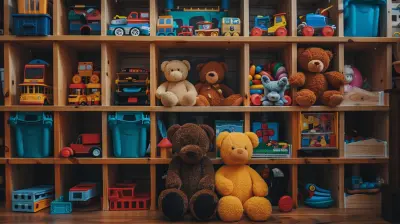1 December 2024
Family roles are part of the glue that holds households together. They provide structure, stability, and expectations that help everyone function smoothly. However, family dynamics aren't always static. Life has a way of shaking things up, and as adults, we often find ways to adapt to new roles that come with those changes. But for kids? That's a whole different story. Understanding and navigating changing family roles can be tough for them, and as parents, it's our responsibility to guide them through these transitions.
In this article, we’ll explore useful strategies to help kids navigate changing family roles, whether you're dealing with divorce, a new sibling, or even a major change like a job relocation. Let’s dive in and learn how you can support your child as they adjust to new realities within the family structure.
What Do We Mean by "Family Roles"?
Before we go deeper, it’s essential to understand what we mean by "family roles." Think of family roles as the unspoken (or sometimes spoken!) expectations that dictate how each family member acts or contributes to the household. For example, in some families, the mom might be the caretaker who ensures the kids get to school, while the dad might handle financial responsibilities like bills and budgeting. Children also have roles in the family dynamic—whether it's helping with chores, being a peacemaker, or playing the clown to keep everyone laughing.So, what happens when these roles shift? Maybe a parent takes on a demanding new job and isn't home as often. Perhaps a new step-parent enters the picture and changes the dynamic between siblings. These adjustments can feel unsettling for kids, causing confusion, stress, or even conflict.
Understanding these role shifts and how they impact kids allows us to become more empathetic, patient, and supportive during times of change. Now, let’s discuss how you can help your child navigate these changes smoothly and confidently.
Common Scenarios Where Family Roles Change
Changes in family roles can emerge from a wide variety of life events. Let's take a look at some common scenarios where family roles may shift significantly:1. Divorce or Separation
Divorce is one of the most significant events that can redefine family roles. When parents split, children often experience feelings of insecurity and uncertainty. They might have to shuffle between two homes, and the loss of the familiar family unit can be disorienting.2. Remarriage and Blended Families
Blended families bring a mix of new relationships and expectations. A child who has always been an only child may suddenly find themselves with step-siblings, or they might struggle to bond with a step-parent. This new setup can feel like being asked to adapt to a completely different set of rules.3. New Siblings and Birth of a Baby
For a child, welcoming a new baby brother or sister can be both exciting and distressing. While the prospect of a new playmate might thrill them, they could also feel neglected or jealous as parents shift more attention toward the newborn.4. Relocation
A family move comes with a cascade of changes that affect everyone. Children may have to adjust to new schools, make new friends, and get used to a new environment. The way each family member functions within the household may also change—they might have new responsibilities or expectations.5. Loss of a Family Member
The death of a family member, especially a close one, can sharply disrupt established roles. If a caregiving parent passes away, the surviving parent might have to take on new responsibilities, and kids might need to assume greater roles to help out at home. Grief can further complicate these changes.
Understanding How Kids Experience Changing Roles
For us adults, we’ve been through enough life changes to build some resilience. We’ve learned how to adapt. But for kids, change can feel like their world is being turned upside down. So, how do kids experience changing family roles?Imagine being in the middle of a movie, knowing the characters, the plot, and the direction the story is going—and suddenly, the storyline changes dramatically. The characters act differently, the storyline veers into unexpected directions, and you’re left trying to make sense of it all. That’s often what changing family dynamics feel like for kids. Their sense of security and routine is suddenly upended.
Some common emotional responses include:
- Confusion: "Why are things different now?”
- Fear: "What if things never go back to normal?"
- Jealousy or feelings of neglect: "Everyone's focusing on the baby, but what about me?"
- Sadness and loss: "I miss how things used to be when everything felt ‘right.’"
- Anger: "I didn’t ask for this! Why is everything changing?"
Recognizing these emotions is the first step to helping your child, but how can parents be proactive in guiding them through these transitions?
Practical Tips to Help Kids Navigate Changing Family Roles
Navigating change isn’t impossible, but it definitely requires some thoughtful approaches. The key is helping your child feel secure even when everything around them feels uncertain. Here are some concrete ways you can help:1. Communicate Openly and Honestly
First and foremost, talk to your child! Whether the family is going through a divorce, adding a new sibling, or moving to a new city, don’t keep them in the dark. Sit them down and explain what’s happening in an age-appropriate way.Avoid sugar-coating things but reassure them that while things may be different now, they will still be okay. Encourage your child to express their feelings—and more importantly, listen. Sometimes, simply acknowledging their emotions can provide significant comfort.
2. Provide Reassurance Through Consistency
As much as possible, try to keep some things stable. Whether that's maintaining their bedtime routine or ensuring they can still play their favorite sport, familiar activities provide a sense of normalcy amidst the chaos. Even in situations like divorce or moving, small consistent gestures—like having breakfast together every morning—help kids feel grounded.3. Give Them Responsibility (But Not Too Much!)
With changing family roles, kids may feel a loss of control. Offering them a small, manageable responsibility can help them regain a sense of agency. Maybe they can help with the new baby by being in charge of fetching diapers, or perhaps they can have a say in decorating their room after a move.However, be careful not to pile on too much responsibility! Sometimes kids might feel the urge to “fix” things (especially after a divorce or loss), so be sure to balance responsibility with plenty of support.
4. Encourage Positive Relationships
When family roles change, relationships can become strained. It's important to encourage positive connections, especially between siblings or with new step-parents. Schedule one-on-one time for each child to ensure they feel valued.In blended families, give kids time to bond with their step-parent naturally. Don’t force relationships but foster opportunities for them to get to know each other (watching a movie together or cooking as a team can be great, low-pressure ways to bond).
5. Use Stories and Books to Explain Changes
Children often relate to stories more than they relate to abstract concepts. If your child is having trouble understanding what’s happening, you can use books or storytelling to explain the situation. For example, books on siblings can soften the blow of welcoming a new baby, and stories about moving can help kids prepare for a big relocation.Stories are a great tool because they create a safe space where your child can explore their feelings without feeling exposed.
6. Practice Patience
Remember, change takes time. Don't expect your child to adapt immediately. Some kids may act out or regress in behavior initially. While it can be frustrating, it’s their way of processing emotions. Be patient, keep the lines of communication open, and give your child the time they need to adjust to their new family reality.7. Focus on Emotional Expression
Children may struggle to articulate their emotions in words, but there are other ways to help them express how they feel. Drawing, journaling, or even role-playing can give them an outlet for their emotions. Let them know it’s okay to feel sad, angry, or frustrated, and that these feelings will fade as they adjust.When to Seek Professional Help
Sometimes, despite your best efforts, a child may continue to struggle with adjusting to a changing family role. If you notice that your child’s behavior has drastically changed—such as withdrawing from activities they used to enjoy, showing signs of prolonged anxiety, or having sleep disturbances—it may be time to seek help from a child therapist or counselor.Professional guidance can provide your child with the additional support they need to navigate these complex emotions. It’s not a sign of failure on your part; it’s about giving your child every possible tool to succeed.
Final Thoughts
Family changes are inevitable. Whether expected or surprising, they can shake the foundation of what kids know to be "normal." However, with open communication, emotional support, and a lot of patience, you can guide your child through these challenging transitions. Keep in mind that every child reacts differently, but with your love and understanding, they’ll find their new place within the evolving family dynamic.Your family's story may change, but what will remain the same is the strength of the bond that holds you together.











Tempra McPherson
Navigating changing family roles can be challenging for kids. It's crucial to foster open communication and validate their feelings. Encouraging resilience and adaptability will empower them to understand and embrace these transitions. Remember, each change is an opportunity for growth and deeper family connections.
February 13, 2025 at 4:04 PM